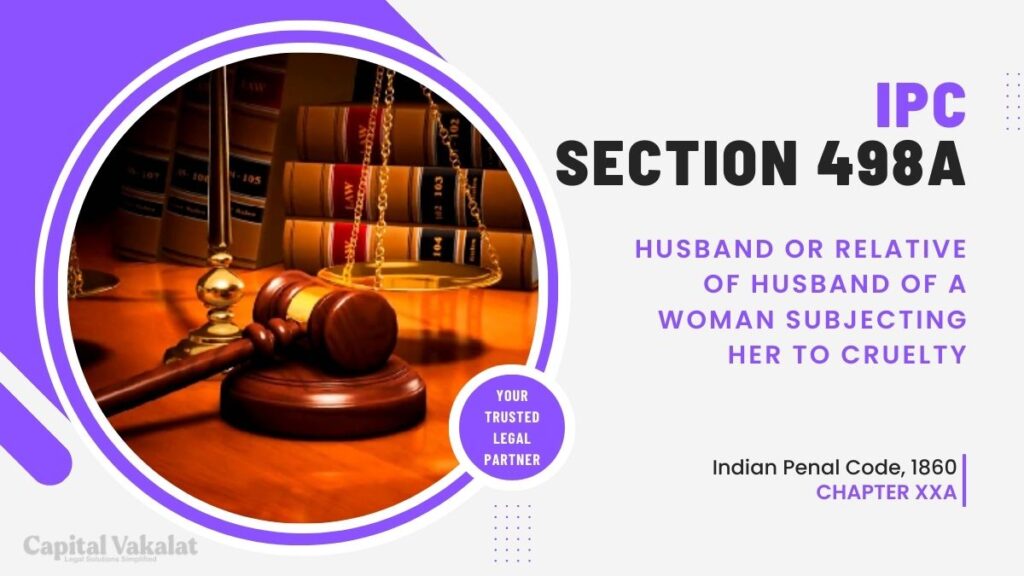In India, the legal framework strives to protect the rights and well-being of individuals, particularly in the context of family and relationships. Section 498A of the Indian Penal Code (IPC) is a significant provision designed to address instances of cruelty within marital relationships.

Let’s delve into the depths of Section 498A, exploring its historical roots, legal implications, societal impact, and the ongoing debates surrounding its application.
Definition of Section 498A IPC
Section 498A of the IPC deals with the offense of subjecting a married woman to cruelty. This section is pivotal in addressing domestic violence and ensuring the protection of married women against any form of harassment or cruelty by their husbands or relatives.
Overview of its Purpose
The primary intent behind the introduction of Section 498A is to safeguard married women from cruelty and harassment in the matrimonial home. It serves as a legal recourse for victims of domestic violence, providing a means to seek justice.
Historical Context
Origin and Enactment of Section 498A
Section 498A was incorporated into the IPC in 1983 as a response to the rising instances of cruelty and harassment faced by married women. The amendment aimed to strengthen legal provisions against domestic violence.
Intent Behind its Introduction
The legislative intent behind Section 498A was to provide women with a tool to address the prevalent issue of cruelty within marriages and to discourage any form of mistreatment.
Understanding Cruelty
Definition of Cruelty within the Legal Context
In the legal realm, cruelty encompasses a wide range of physical and mental abuse. Understanding the legal definition is crucial in comprehending the scope of Section 498A.
Examples and Scenarios Covered Under Section 498A
Section 498A covers various scenarios, including physical abuse, mental torture, and harassment for dowry. It is essential to explore the diverse forms of cruelty addressed by this provision.
Scope and Applicability
Persons Covered Under Section 498A
Section 498A applies to husbands or relatives of husbands who subject a woman to cruelty. A detailed examination of the persons covered sheds light on the breadth of its applicability.
Types of Relationships Considered Within the Law
Beyond marital relationships, Section 498A extends its coverage to various familial ties. Understanding the types of relationships considered under the law is crucial for its proper application.
Legal Implications
Punishments and Penalties for Offenses Under Section 498A
A critical aspect of Section 498A is the legal consequences perpetrators face. Exploring the punishments and penalties attached to offenses provides insight into the severity of the law.
Legal Procedures and Remedies Available to Victims
Victims of cruelty have legal avenues to seek justice. Understanding the legal procedures and remedies available under Section 498A is essential for those navigating the legal system.
Misuse of Section 498A
Cases of False Allegations and Their Consequences
While Section 498A serves a noble purpose, instances of false allegations have raised concerns. Delving into cases of misuse and their consequences is crucial for a balanced perspective.
Steps Taken by the Legal System to Curb Misuse
To address the issue of misuse, the legal system has implemented various measures. Examining these steps sheds light on efforts to maintain the integrity of Section 498A.
Evolving Jurisprudence
Landmark Judgments Shaping the Interpretation of Section 498A
Landmark judgments play a pivotal role in shaping the interpretation of Section 498A. Exploring key legal decisions provides context to the evolving jurisprudence surrounding this provision.
Changes and Amendments to the Law Over Time
The legal landscape is dynamic, with amendments and changes shaping the contours of Section 498A. Understanding these developments is crucial for a comprehensive perspective.
Societal Impact
Discussion on the Social Implications of Section 498A
Beyond its legal ramifications, Section 498A has broader societal implications. A discussion on its impact provides insights into the role of this provision in shaping social attitudes.
Efforts Towards Raising Awareness and Addressing Domestic Violence
Initiatives aimed at raising awareness about domestic violence and Section 498A are vital in fostering a supportive environment for victims. Exploring these efforts highlights the multifaceted approach to the issue.
Criticisms and Debates
Controversies Surrounding Section 498A
No legal provision is without its controversies. Analyzing the criticisms and debates surrounding Section 498A offers a nuanced understanding of the challenges it faces.
Calls for Reforms and Potential Amendments
In response to criticisms, there have been calls for reforms and amendments to Section 498A. Exploring these proposals provides insight into ongoing efforts to refine the legal framework.
Conclusion
In conclusion, Section 498A of the IPC remains a crucial legal provision designed to protect married women from cruelty and harassment. As we navigate its historical roots, legal implications, and societal impact, it is evident that Section 498A continues to play a vital role in addressing domestic violence.
Frequently Asked Questions
How has the legal system addressed concerns about the misuse of Section 498A?
The legal system has implemented measures to address misuse, and those making false allegations may face legal consequences.
Are there ongoing debates about the relevance of Section 498A?
Yes, there are debates surrounding Section 498A, with calls for reforms and amendments to address concerns and criticisms.
What role do landmark judgments play in shaping the interpretation of Section 498A?
Landmark judgments play a significant role in interpreting and shaping the understanding of Section 498A within the legal system.
How can society contribute to addressing domestic violence beyond the legal framework?
Society can combat domestic violence by promoting awareness, encouraging open dialogue, supporting victims through networks, advocating for preventive policies, and fostering a culture of empathy and respect within communities.